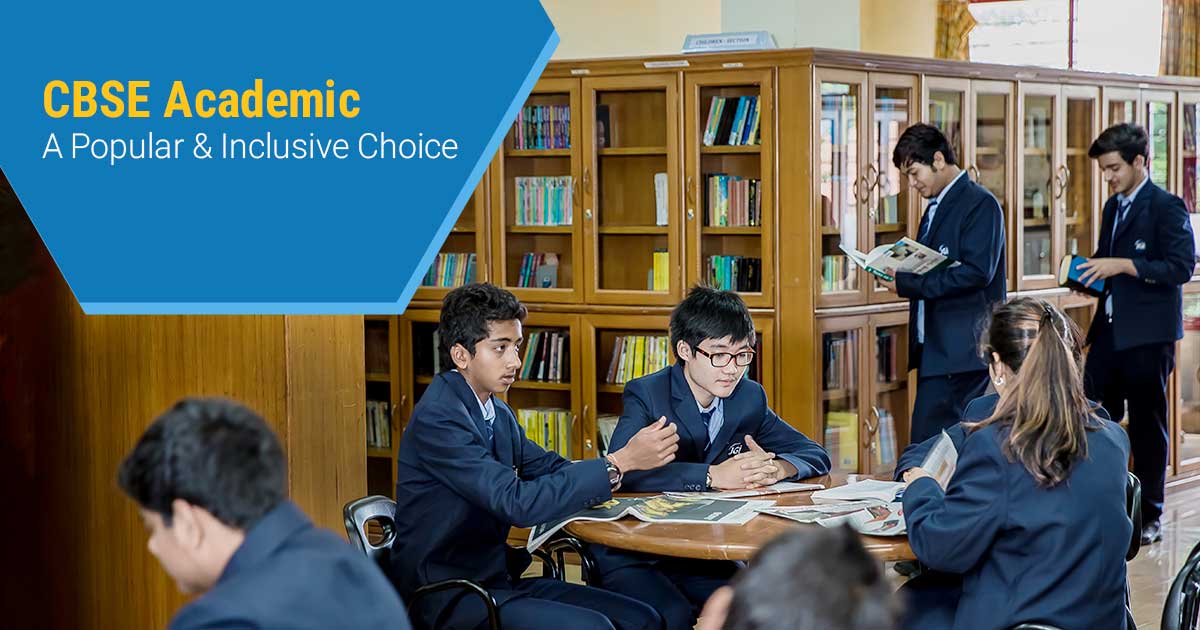

Central Board of Secondary Education (CBSE), is a national-level board of education under the Union Government of India, known for its inclusive approach and comprehensive curriculum. It is responsible for conducting examinations and formulating the curriculum for affiliated schools across the country and abroad.
CBSE is hailed as one of the most popular and widely recognised curricula in India. Here are some key reasons why the CBSE academic programme is so popular:
National Curriculum and Extensive Network: CBSE adheres to a standardised curriculum at the national level, extending its operations not only across the country but also beyond its borders. Its national presence ensures uniformity in education across the country and abroad. The CBSE curriculum caters to the diverse needs of students from different states, communities, and regions.
The extensive network of schools affiliated with CBSE allows students to receive standardised, state-of-the-art education anywhere within the country and elsewhere. Therefore, it facilitates smooth transitions for students who need to relocate during their academic journey without significant disruptions.
Widespread Recognition and Acceptance: As CBSE is widely recognised and accepted in India and abroad, this provides ample opportunities to its students for higher education and a bright future waiting for them.
Focuses on All-Round Development: This curriculum believes that studying alone is not enough for the students, and they must involve themselves in extracurricular activities like arts, music, sports, dance, cultural events, etc. Therefore, it emphasises holistic development by promoting extracurricular activities alongside academics. These activities help in nurturing their physical, mental, emotional, and social growth, leading to a well-rounded personality.
Continuous and Comprehensive Evaluation (CCE): CBSE follows the CCE system, which involves regular and continuous assessment of students throughout the academic year. This approach aims to reduce the increasing academic stress and pressure on young students, encourage active learning, and provide a comprehensive evaluation of students' progress.
Inclusive Education: CBSE strives to render an inclusive format of education by catering to the diverse needs of students. It provides equal opportunities to students with disabilities, special needs, or learning difficulties.
Balanced Syllabus: CBSE offers a comprehensive and balanced curriculum that aims to foster the cognitive, social, and emotional development of children. The curriculum covers a wide range of subjects, including languages, sciences, mathematics, social sciences, and other elective subjects that prepare them for higher education and diverse professional pursuits.
Competitive Exams Preparation: Being a nationalised board of education, CBSE provides a gateway to various competitive exams in India such as engineering (JEE and JEE Advanced) and medical entrance exams (NEET), through its curriculum and teaching methodologies.
Digital and Technological Inclusion: In recent years, CBSE has embraced digital technologies to take its teaching and education system to the next level. As the world is becoming more global with each passing day, CBSE has introduced different initiatives to foster the growth of students in the digital sphere. This is done through the introduction of digital or smart classrooms, online resources, e-learning platforms, and digital assessments to keep pace with technological advancements.
Practical-based Learning: This curriculum emphasises practical-based learning and therefore allows students to learn beyond the classroom walls. The board has encouraged schools to organise field trips, educational tours, and community service activities to help develop a broader perspective and instil values like empathy, social responsibility, and environmental consciousness in young minds.
Wrapping it up
To put it in a nutshell, CBSE, as a national-level educational board in India, stands out for its emphasis on promoting conceptual understanding and critical thinking among its students. The board focuses on nurturing students' abilities to evaluate, analyse, and implement knowledge rather than just memorising information.
The customised and well-structured curriculum allows students to kindle their curiosity and encourages them to ask questions, explore different perspectives, and develop a deeper understanding of subjects. Studying at a CBSE school enables students to develop problem-solving skills, creativity, and the ability to think critically. These aspects contribute immensely to building a progressive and evolving educational environment, thus, making CBSE a popular academic choice.
Recent Blogs
Site Designed and Maintained By : Office of Communications, JAIN Group All rights reserved.